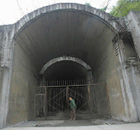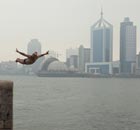Global General
Global efforts to address nuke terror threat
By Tan Yingzi (China Daily)
Updated: 2010-04-12 07:27
 |
Large Medium Small |
Leaders gather for security summit in Washington
WASHINGTON - Faced with the growing threat of nuclear terrorism, the Nuclear Security Summit will offer an opportunity for the international community to forge new agreements to protect nuclear materials and technology.
One year after US President Barack Obama first suggested a summit, more than 40 world leaders will gather in Washington DC on Monday and Tuesday to discuss how to prevent nuclear terrorism, secure nuclear materials and strengthen the role of the International Atomic Energy Agency (IAEA).
Attendees will include leaders from China, India, Pakistan and Russia, as well as representatives from the United Nations, the European Union and the IAEA. Iran and the Democratic People's Republic of Korea will not be represented.
President Obama laid out his nuclear agenda in a speech in Prague last year. He said terrorists are determined to buy, build or steal nuclear weapons.
The purpose of the summit is to develop a plan to secure nuclear materials, prevent smuggling of nuclear material, and deter, detect and disrupt attempts at nuclear terrorism.
It will also seek to expand the current nuclear security landscape, encouraging nations to help each other enhance security.
Alexandra Toma, a nuclear security expert with the Connect US Fund, said the danger is real. "It's the number one threat to American security today - to American and global security, frankly," she said.
Recent reports have shown that several terrorist groups, including Al-Qaida, have been trying to get nuclear weapons for more than a decade, Toma said.
There is enough weapons-grade nuclear material spread across the globe to build more than 120,000 nuclear bombs. In some countries and regions, significant stockpiles are not adequately protected, and securing them is essential to prevent terrorists from acquiring or building nuclear weapons, according to the Fissile Materials Working Group, a collection of more than 40 leading experts in nuclear security and nonproliferation.
There are nearly 40 countries with stockpiles of plutonium or highly enriched uranium. The largest stockpiles of these materials are in Russia, followed by the US. The United Kingdom, France and China also have significant stockpiles of highly enriched uranium.
Experts say the Nuclear Security Summit is the most important demonstration to date of a broad multinational commitment to secure nuclear materials.
A successful summit would be marked by commitments from more than 40 world leaders, and by a broad consensus that nuclear terrorism is a threat to all nations, according to Matthew Bunn, associate professor at Harvard University's John F. Kennedy School of Government and co-principal investigator for the Project on Managing the Atom.
"Nuclear material anywhere is a threat to everyone, everywhere," Bunn said. "Securing these stocks is a big job, a complicated job, but a do-able job."
"If all the participants vow to work together for nuclear security, that in itself will be a breakthrough," said Rear-Admiral Yang Yi of the Beijing-based PLA University of National Defense.
A draft of the communiqu that organizers hope to issue at the end of the conference calls for tougher criminal prosecution of traffickers, better accounting of weapons-grade nuclear materials and more international collaboration, according to The Wall Street Journal.
But experts doubt that this week's summit will go that far.
"The communiqu will be much more general than President Obama seems to be suggesting," said Bunn. "There is going to have to be ongoing discussion beyond the Nuclear Security Summit."
China's Yang Yi said that while the summit may convince people of the threat posed by nuclear terrorism, reducing the threat will require careful record-keeping and control of existing weapons.
Some countries have yet to be convinced of the importance of the Obama administration's nuclear security policy.
"Because the goal of securing all vulnerable nuclear materials is extremely ambitious, it could face significant opposition from some of the summit attendees and other countries," said Kenneth Luongo, president and founder of the Partnership for Global Security and co-chair of the Fissile Materials Working Group.
Luongo said some countries do not believe terrorists want to obtain nuclear materials to build a bomb.
"A lot of countries are not buying the fact that nuclear terrorism is a high priority and there's a big divide between the view of the United States and some of its key allies and the rest of the world, in particular in the developing world," he said.
CHINA DAILY










